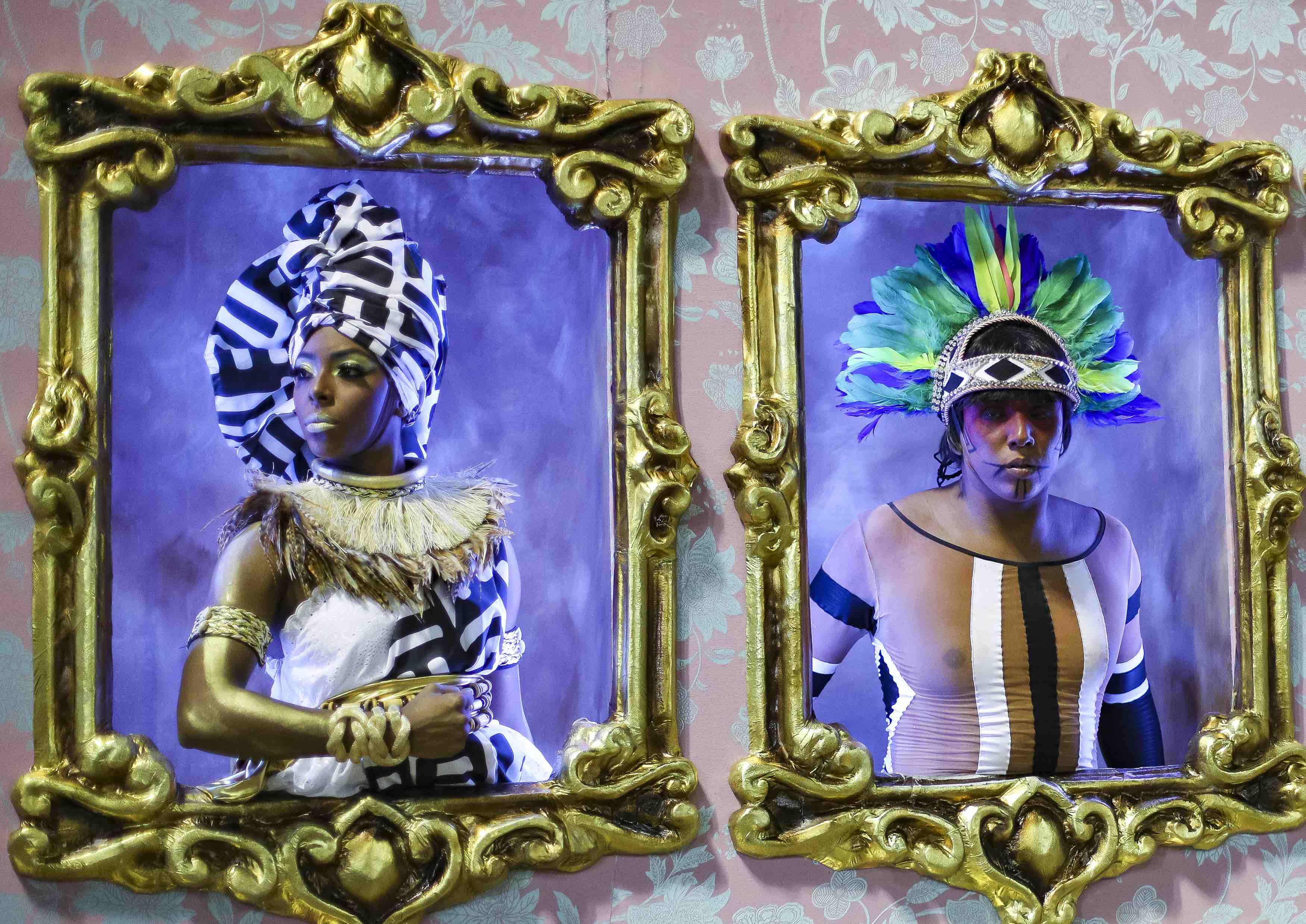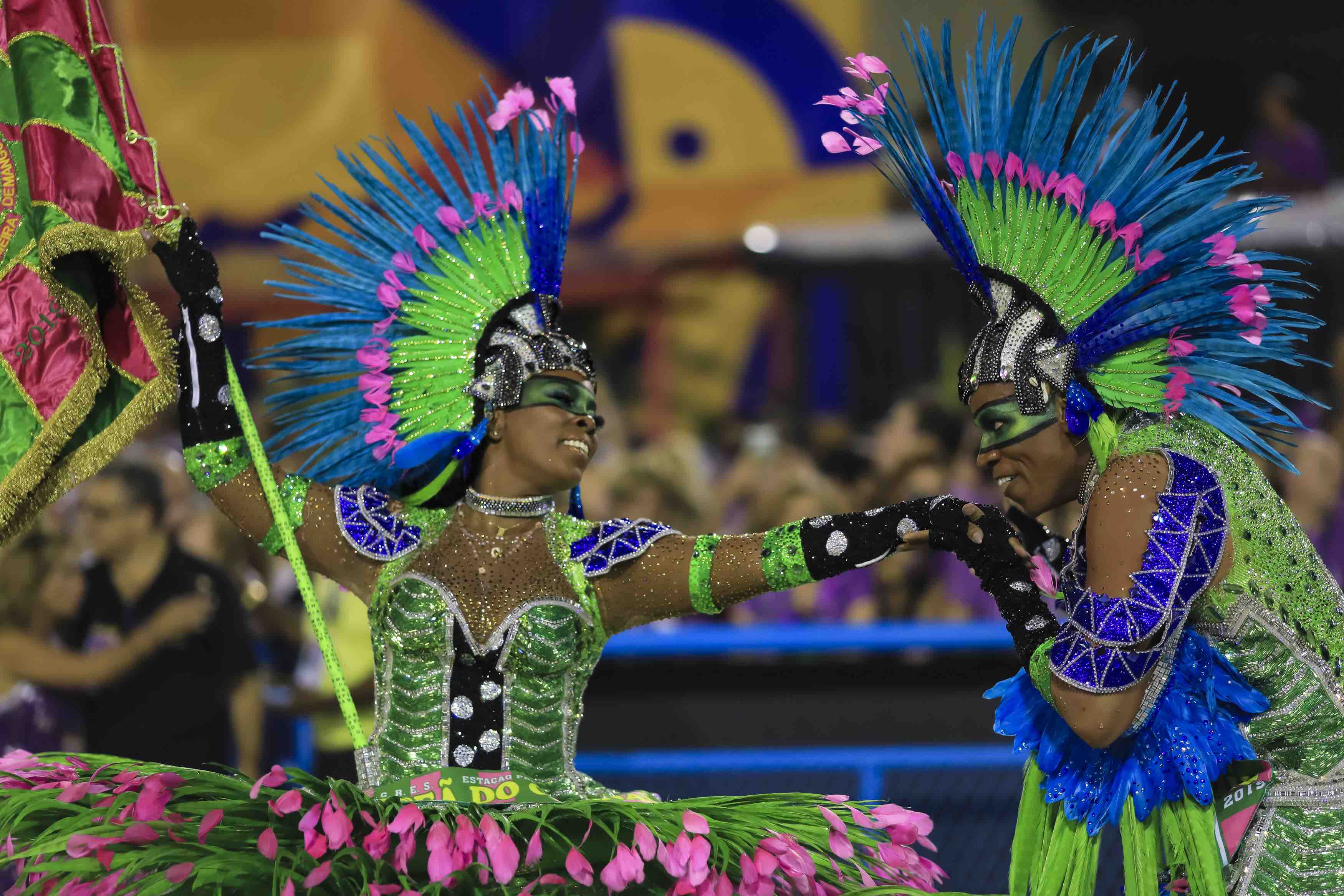“Índios, negros e pobres.” With these words – emblazoned on a pink, white, and green version of the Brazilian flag – the Grêmio Recreativo Escola de Samba Estação Primeira de Mangueira paid tribute to the communities that have been historically underrepresented within the country.
As Jair Bolsonaro, a far right president, makes his mark on the South American country, the fight for democracy has become vital for Brazil, and diverse groups have taken action toward social justice and equality. Carnaval was just another opportunity to draw attention to the people and rights that are under threat. This year, Mangueira picked História Para Ninar Gente Grande (or History for Lulling Adults) as its theme. But instead of presenting a fairy tale-esque bedtime story, the school aimed to awaken Brazilians to their true story while challenging the so-called official history that has been passed down. As Mangueira’s Leandro Vieria explains, the 2019 theme shows the “pages” that are missing from history books.

“It’s an alternative version of history,” he says, according to Mangueira’s official site. “Brazil’s history has turned into a soccer match, in which we have learned to support the winner. We forget, however, that we are the ones who have lost.”
The entire March 4 production focused heavily on these marginalized groups. One scene, for example, mocks the Portuguese, who first appear to be smaller (a comment on how their history is less relevant) and then are locked in place behind frames in unflattering poses, and gives Afro-Brazilians and Indigenous peoples, who in turn, look regal behind golden frames, a starring role. At one point, a young Black girl holds a sign that reads “presente.” At the end, the school presented what should be the country’s alternative flag.
Manu da Cuíca, who helped write lyrics to Mangueira, says the music matches this story. “We decided it shouldn’t sound like a moan nor like something euphoric,” she tells me. “It should sound like a claim. The claim for a real country, the country of the people’s heroes, not one of unframed barons. In times when our politicians don’t debate their projects, we invite Brazilians for a talk, an affective talk. As soon as people recognize the Brazilian people as the protagonists of their own accomplishments, they will relate to these heroes.”

Mangueira honored the legacy of many heroes, who despite the anonymity in present day, played a fundamental role in defending the rights of Brazil’s underprivileged groups – people like Luiza Mahin, the female leader of the biggest slave rebellion in Brazil; Tereza de Benguela, a woman who ran one of Brazil’s most important quilombos; and Cunhambebe, Indigenous leader who organized to fight Portuguese colonizers.
“We celebrate the 500th anniversary of Brazil’s ‘discovery’ without realizing we are Brazilians for more than 12,000 years,” Vieira says. “But we insist we are a 500 year-old country, associating the Indigenous peoples with the past. Indigenous, black, mixed-race people haven’t gained a statue. Their names are not in the school exams. They are not [answers to] multiple choice questions.”
But while the school focused on the past, it also looked to current heroes, such as Marielle Franco, the Rio politician and activist who was murdered a year ago. Despite the growing pressure from Brazil’s society and the international community, the crime remains unsolved. Several schools and blocos paid homage to Franco this year.
On Ash Wednesday, Mangueira won Rio’s most important samba school championship, its 20th win. And while there was a lot of support for the school – including from its rivals – there was also a lot of criticism. Mangueira chose to confront the country’s ugly history and to elevate those who remain absent in history books, all of which offended conservatives, including Bolsonaro’s son, Carlos, who took to Twitter to express his displeasure. Bolsonaro, himself, was caught up in controversy after sharing a sexually explicit video, which many felt was meant to shame the LGBT community, that he used to demonize Carnaval.

“This is a message to Brazil, which has to understand the importance of Carnaval,” Vieira says. “This is also a message to President Bolsonaro, who needs to show this Carnaval to the world: the Carnaval of Art, the people’s Carnaval.”
Among the reasons Mangueira may have bothered conservatives is the fact that the theme came as a response to a far-right bill – known as the School Without Political Parties bill – that aims to forbid teachers from discussing gender, ideology, and politics in class. Some argue that discussing these things leads to the indoctrination of students.
But as Vieira challenges, the bill is dangerous because it hides our differences and seemingly wants to squash critical thinking. He says the law will lull people, which is where the name of the theme came from, and it’s another reason why Mangueira’s show was so important this year.
“The narrative presented by this samba dialogues with the lives of many members and supporters of Mangueira,” says Luan Gustavo, who has participated in Carnaval as a Mangueira passista for the past eight years. “All of these lives are constantly silenced by Brazil’s tough reality. But History for Lulling Adults talks to our reality. Carnaval has been under attack by politicians who act as religious fundamentalists. And the attacks have penetrated the flesh of those who live for, of, and by Rio’s Carnaval.”
Watch Mangueira’s full parade here.







